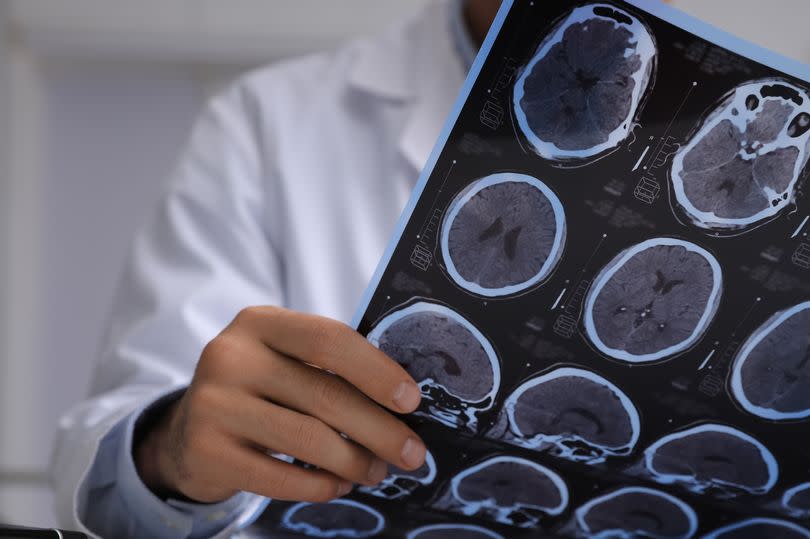A simple blood test may soon be able to detect early signs of multiple sclerosis (MS), years before symptoms appear.
US researchers have found a marker in the blood of people who are on track to develop a debilitating autoimmune disease. This breakthrough could lead to thousands of people diagnosed with MS each year receiving earlier treatment.
Scientists have found that in about one in 10 cases of MS, the body begins producing a “unique” set of antibodies against its own proteins years before symptoms appear. These autoantibodies appear to bind to both human cells and common pathogens, possibly explaining the immune attacks on the brain and spinal cord that are hallmarks of MS.
Severe MS can leave patients confined to wheelchairs, but new treatments may slow the progression of the disease and preserve the ability to walk, for example. Early symptoms of MS, such as dizziness, spasms, and fatigue, can mimic other conditions, and diagnosis requires careful analysis of brain MRI scans.
Autoimmune diseases such as MS are thought to result in part from rare immune responses to common infections.
The research team from the University of California at San Francisco (UCSF) hopes that the autoantibodies they discovered will one day be detected with a simple blood test, giving patients a head start on treatment.
“Over the last few decades there has been a movement to treat MS earlier and more aggressively with newer and more potent treatments,” said Professor Michael Wilson, a UCSF neurologist and senior author of the study. “A diagnostic result like this makes this type of early intervention more possible, giving patients hope for a better life.”


In 2014, Prof Wilson worked with Professor Joe DeRisi to develop better methods for identifying the causes behind autoimmune diseases. They developed a technique known as phage display immunoprecipitation sequencing (PhIP-Seq), which involves imaging protein fragments on the surface of viruses, and used it to screen human blood for autoantibodies.
This method can detect autoantibodies against more than 10,000 human proteins and enables the investigation of almost all autoimmune diseases. In 2019, they used the technique to identify a rare autoimmune disease that appeared to be caused by testicular cancer.
The team at UCSF believed that the phage display system could reveal the autoantibodies responsible for immune attacks in MS and open new avenues for understanding and treating the disease.
They collaborated with Professor Mitch Wallin of the University of Maryland to investigate autoantibodies in the blood of people with MS. Blood samples were obtained from the U.S. Department of Defense Serum Repository, where blood from service members applying to join the armed forces is stored.
The team examined blood from 250 MS patients collected after diagnosis, along with samples taken five or more years earlier when they were enrolled. They also examined similar blood samples from 250 healthy veterans.
Using only one-thousandth of a milliliter of blood at a time, the scientists predicted to observe an increase in autoantibodies when the first MS symptoms appeared. But their findings showed that 10 percent of MS patients had a “striking amount” of autoantibodies, even years before their diagnosis.
Each of these autoantibodies was bound to a chemical structure similar to that found in common viruses, including the Epstein-Barr Virus (EBV), which is known to infect more than 85 percent of all individuals and has previously been identified as a possible contributing factor to MS.
This subset of MS patients exhibited other signs of an immunological “war” taking place in their brains, years before diagnosis. As published in the journal Nature Medicine, patients with autoantibodies also had increased levels of neurofilament light (Nfl), a protein released during neuronal degeneration.
Prof DeRisi said: “When we analyze healthy people using our technology, everyone looks unique, with their own fingerprint of immunological experience, like a snowflake.”
“We start to suspect something is wrong when one person’s immunological signature resembles another and stops looking like snowflakes, and that’s what we found in these MS patients.”
To confirm their findings, the team examined blood samples from patients participating in the UCSF Origins study. All of these patients experienced neurological symptoms, and many, but not all, were eventually diagnosed with MS.
Remarkably, one in 10 patients diagnosed with MS in the Origins study exhibited the same autoantibody pattern. This model was 100 percent predictive of MS diagnosis.
Prof Wilson said: “Diagnosis for MS is not always straightforward because we haven’t had disease-specific biomarkers. We’re excited to have anything that can provide earlier diagnostic accuracy so we can have a concrete discussion about whether to start treatment.” every patient.”
While there are still many questions about MS, the team believes they now have a definitive sign that MS is developing.
Study co-author Professor Stephen Hauser, director of the UCSF Weill Institute for Neurosciences, added: “Imagine if we could diagnose MS before some patients reach the clinic. This increases our chances of moving from suppression to treatment.”
Don’t miss the latest news from Scotland and beyond. Sign up for our daily newsletter.